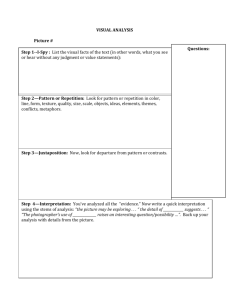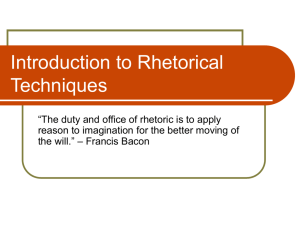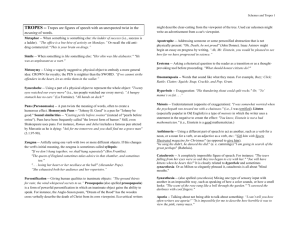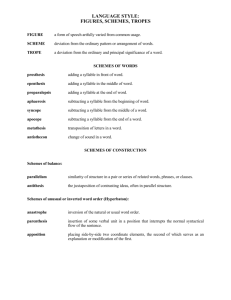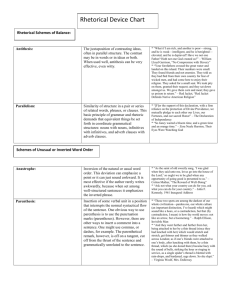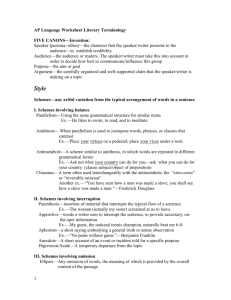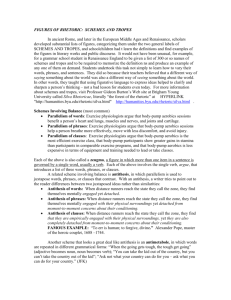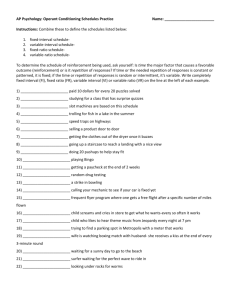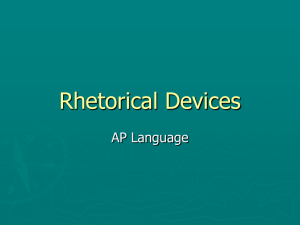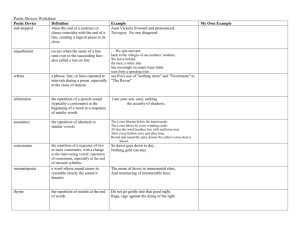File - Wildcat Freshmen English
advertisement
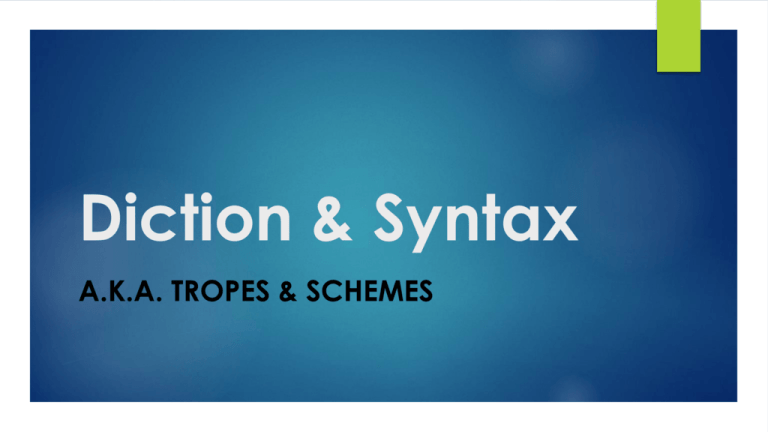
Diction & Syntax A.K.A. TROPES & SCHEMES Scheme: A change in standard word order or pattern. Trope: The use of a word, phrase, or image in a way not intended by its normal signification. Tropes and schemes are collectively known as figures of speech. The following is a short list of some of the most common figures of speech. I have selected figures that politicians and pundits use often--especially schemes of repetition and word order, which convey authority. Schemes A.K.A. Syntax Schemes of Balance Parallelism—similarity of structure in a pair or series of related words, phrases or clauses. Emphasizes similarities and connections: He tried to make the law, clear, precise and equitable. ...we mutually pledge to each other our Lives, our Fortunes, and our sacred Honor. (The Declaration of Independence) Isocolon (ī-sō-cō-lon)—use of parallel elements similar not only in structure, as in parallelism, but in length (that is, the same number of words or even syllables); it contributes to the rhythm of sentences: His purpose was to impress the ignorant, to perplex the dubious, and to confound the scrupulous. Antithesis (an-tith-a-sis)—the juxtaposition of contrasting ideas, often in parallel structure. Emphasizes dissimilarities and contraries; produces the quality of an aphorism: Though argumentative, he was modest; though inflexible, he was candid; and though metaphysical, yet orthodox. (Dr. Samuel Johnson, in the London Chronicle, May 2, 1769) Parallelism -- When the writer establishes similar patterns of grammatical structure and length. Ex: "King Alfred tried to make the law clear, precise, and equitable.” The previous sentence has parallel structure in use of adjectives. However, the following sentence does not use parallelism: Not an Ex: "King Alfred tried to make clear laws that had precision and were equitable.” Schemes of unusual or inverted word order Anastrophe (a-nas-trō-fē)—A scheme in which normal word order is changed for emphasis. Example: "Ask not what your country can do for you; ask what you can do for your country.“ Parenthesis (pa-ren-tha-sis)—insertion of some verbal unit in a position that interrupts the normal syntactical flow of the sentence. Allows the author’s voice to be heard commenting or editorializing, thereby charging the statement with emotion: But wherein any man is bold—I am speaking foolishly—I also am bold…. Are they ministers of Christ? I—to speak as a fool—am more. (2 Cor. 11:21-23.) Apposition (ap-a-zish-en)—A scheme in which a person or an abstract quality is directly addressed, whether present or not. Example: "Freedom! You are a beguiling mistress." John Morgan, the president of the Sons of the Republic, could not be reached by phone. Schemes of Omission Ellipsis (ē-lip-sis)—deliberate omission of a word or of words which are readily implied by the context. An artful and arresting means of securing economy of expression: And he to England shall along with you. (Hamlet, III, iii, 4) Asyndeton (a-sin-da-ton)—deliberate omission of conjunctions between a series of related clauses. Produces a hurried rhythm in the sentence: Ex: Veni. Vidi. Vici. “I came. I saw. I conquered.” (As opposed to “I came, and I saw, and then I conquered.”) Ex: Been there. Done that. Bought the tee-shirt. Schemes of Repetition Polysyndeton (pol-ē-sin-de-ton)— the opposite of asyndeton: polysyndeton is the deliberate use of many conjunctions. Suggests flow or continuity in some instances, special emphasis in others: "Who killed him?" and he said, "I don't know who killed him but he's dead all right," and it was dark and there was water standing in the street and no lights and windows broke and boats all up in the town and trees blown down ... (Hemingway) This semester I am taking English and history and biology and mathematics and sociology and physical education. Alliteration (a-lit-er-ā-shun)—Repetition of a sound in multiple words. Contributes to euphony of verse; sometimes used for humorous effect: Ex: buckets of big blue berries. If we want to be super-technical, alliteration comes in two forms. 1. Consonance is the repetition of consonant sounds: many more merry men. If the first letters are the consonants that alliterate, the technique is often called head rhyme. 2. Assonance is the repetition of vowel sounds: refresh your zest for living. Often assonance can lead to outright rhymes. Anadiplosis (an-a-di-plō-sis)—repetition of the last word of one clause at the beginning of the following clause. Labor and care are rewarded with success, success produces confidence, confidence relaxes industry, and negligence ruins the reputation which diligence had raised. (Samuel Johnson, Rambler No. 21) Anaphora -- Repetition of beginning clauses. Ex: “We shall not flag or fail. We shall go on the end. We shall fight in France, we shall fight on the seas and oceans. We shall fight with growing confidence and growing strength in the air. We shall defend our island, whatever the cost shall be.” (Churchill) Do you ever feel like a plastic bag Drifting through the wind, wanting to start again? Do you ever feel, feel so paper thin Like a house of cards, one blow from caving in? Do you ever feel already buried deep six feet under? Scream but no one seems to hear a thing Do you know that there's still a chance for you 'Cause there's a spark in you? Climax (klī-maks)—arrangement of words, phrases or clauses in an order of increasing importance. Renounce my love, my life, myself—and you. (Alexander Pope, "Eloisa to Abelard") I think we've reached a point of great decision, not just for our nation, not only for all humanity, but for life upon the earth. (George Wald, "A Generation in Search of a Future" 1969) Antimetabole (an-tē-ma-tab-ō-lē)—repetition of words, in successive clauses, in reverse grammatical order. Produces the impressive turn of phrase typical of an aphorism: One should eat to live, not live to eat. (Moliere, L 'Avare) Epistrophe (a-pis-trō-fē)—Repetition of a concluding word. Sets up a pronounced rhythm and secures a special emphasis: Shylock: I'll have my bond! Speak not against my bond! I have sworn an oath that I will have my bond! (The Merchant of Venice, III.iii.3-4) Epanalepsis (e-pon-a-lep-sis)—Repeating a word from the beginning of a clause at the end of the same clause. Gives language an appearance of emotional spontaneity: Ex: "Year chases year.“ Ex: "Man’s inhumanity to man." Ex: Voltaire: “Common sense is not so common.” Ex: Shakespeare: “Blood will have blood.” Ex: Biblical: “an eye for an eye, and a tooth for a tooth, a life for a life.” Chiasmus (kī-az-mus)—reversal of grammatical structure in successive phrases or clauses (literally, “the criss-cross). Like antimetabole, but without the repetition: By day the frolic, and the dance by night. (Samuel Johnson, “The Vanity of Human Wishes) “Naked I rose from the earth; to the grave I fall clothed.” Polyptoton (pō-lip-ta-than)—repetition of words derived from the same root. Similar to word play, but the meanings of the words do not lose their literal meaning: The Greeks are strong, and skilful to their strength. Fierce to their skill, and to their fierceness valiant. (Shakespeare, Troilus and Cressida I.i.7-8) Tropes A.K.A. DICTION… Tropes of Comparison Metaphor (met-a-for)—an implied comparison between two things of unlike nature that yet have something in common; a comparison of two things without using the words “like” or “as”. Ex: Time is a thief. Simile (sim-a-lē)—an explicit comparison between two things of unlike nature that yet have something in common; a comparison of two things using either “like” or “as”. Ex: They fought like cats and dogs. Synecdoche (si-nek-da-kē)—a figure of speech in which a part stands for the whole. All hands on deck. • genus substituted for the species: vessel for ship, weapon for sword, creature for man, arms for rifles, vehicle for bicycle • species substituted for the genus: bread for food, cutthroat for assassin • part substituted for the whole: sail for ship, hands for helpers, roofs for houses • matter for what is made from it: silver for money, canvas for sail, steel for sword Metonymy (me-tahn-a-mē)—substitution of some attributive or suggestive word for what is actually meant. Using a vaguely suggestive, physical object to embody a more general idea: crown for royalty wealthy for rich people brass for military officers bottle for wine pen for writers Tropes of Word Play Puns—generic name for those figures which make a play on words. There are three types of puns: 1. Antanaclasis (an-ta-nak-la-sis)—repetition of a word in two different senses. But lest I should be condemned of introducing license, when I oppose licensing. (John Milton, Areopagitica, 1644) 2. Paranomasia (par-a-nō-mā-zha)—use of words alike in sound but different in meaning. Neither hide nor hair of him had been seen since the day that Kwame Nkrumah had been ostrichized, accused of being the biggest cheetah in Ghana, but safaris anyone knew, no fowl play was involved. (Article in Time, April 8, 1966) 3. Syllepsis (si-lep-sis)—use of a word understood differently in relation to two or more other words, which it modifies or governs. There is a certain type of woman who’d rather press grapes than clothes. (Ad for Peck & Peck suits) Zeugma (zoog-ma)—One word, usually a noun or a verb, governs two other words not related in meaning; not considered a form of pun. If skillfully managed, zeugma can be an impressive display of wit, but often is nothing more than a faulty use of ellipsis. He maintained a flourishing business and racehorse. I just blew my nose, a fuse, and three circuit breakers. (Muppets) Anthimeria (an-tha-mer-ē-a)—the substitution of one part of speech for another. In the example below, a noun is used as a verb. Dozens of examples are found in Shakespeare’s plays. I've been Republicaned all I care to be this election year. (Noun used as verb) I will Photoshop my pictures and send them to you. (a product by Adobe=to mean any type of digital image) Periphrasis (pa-rif-a-sis)—substitution of a descriptive word or phrase for a proper name or of a proper name for a quality associated with the name. They do not escape Jim Crow; they merely encounter another, not less deadly variety. (James Baldwin, Nobody Knows My Name) When you’re out of Schlitz, you’re out of beer. (Ad slogan for Schlitz beer) Personification (Prosopopoeia) (pra-sō-pō-pē-a)—investing abstractions or inanimate objects with human qualities or abilities. The way in which this trope gives its subject human qualities allows it to lend itself to emotional appeals. He glanced at the dew-covered grass, and it winked back at him. (Student paper) Apostrophe (a-pos-tra-fē)—addressing an absent person or a personified abstraction. Apostrophe imbues its subject with an emotional charge as personification does. O eloquent, just and mighty Death! whom none could advise, thou hast persuaded; what none hath dared, thou hast done; and whom all the world has flattered, thou only hast cast out the world and despised. (Sir Walter Raleigh’s History of the World) Tropes of Exaggeration Hyperbole (hī-pur-ba-lē)—the use of exaggerated terms for the purpose of emphasis or heightened effect. Hyperbole can be a serviceable figure of speech if we learn to use it with restraint and for a calculated effect. It's raining cats and dogs. My left leg weighs three tons. It is embalmed in spices like a mummy. I can’t move. (Thomas Bailey Aldrich, “Marjorie Dew) Litotes (lī-ta-tēz)—deliberate use of understatement, not to deceive someone but to enhance the impressiveness of what is stated. To write is, indeed, no unpleasing employment. Last week I saw a woman flayed, and you will hardly believe how much it altered her appearance for the worse. (Jonathan Swift, A Tale of a Tub) Rhetorical Question (erotema) (er-ot-a-ma)—asking a question, not for the purpose of eliciting an answer but for the purpose of asserting or denying something obliquely. Rhetorical questions can be an effective persuasive device, subtly influencing the kind of response one wants to get from an audience, and are often more effective as a persuasive device than is a direct assertion. Irony (ī-ra-nē)—use of a word in such a way as to convey a meaning opposite to the literal meaning of the word. Irony must be used with great caution: if the speaker misjudges the intelligence of her audience, she may find that her audience takes her words in their ostensible sense rather than in the intended opposite sense. For Brutus is an honourable man; So are they all, honourable men. (Shakespeare, Julius Caesar, III.ii.88-89) Fielder smiled, “I like the English, he said. “That gives me a nice warm feeling,” Leamas retorted. (John LeCarré, The Spy Who Came in from the Cold) Sarcasm (sar-ka-zum)—witty language used to convey insults or scorn. No opera plot can be sensible, for in sensible situations people do not sing. (W.H. Auden) Ugliness is in a way superior to beauty because it lasts. (Serge) Onomatopoeia (on-a-mot-a-pē-a)—use of words whose sound echoes the sense. Ex: "Chug, chug, chug. Puff, puff, puff. Ding-dong, ding- dong. The little train rumbled over the tracks." (The Little Engine That Could) Oxymoron (ok-sē-mor-on)—the yoking of two terms that are ordinarily contradictory. By thus combining contradictories, writers produce a startling effect. O miserable abundance, O beggarly riches! (John Donne, Devotions Upon Emergent Occasions) Other examples include expressions like sweet pain, cheerful pessimist Paradox (par-a-doks)—an apparently contradictory statement that nevertheless contains a measure of truth. Paradox is like oxymoron in that both are built on contradictories, but paradox may not be a trope at all, because it involves not so much a “turn” of meaning in juxtaposed words as a “turn” of meaning in the whole statement. Art is a form of lying to tell the truth. (Pablo Picasso)
